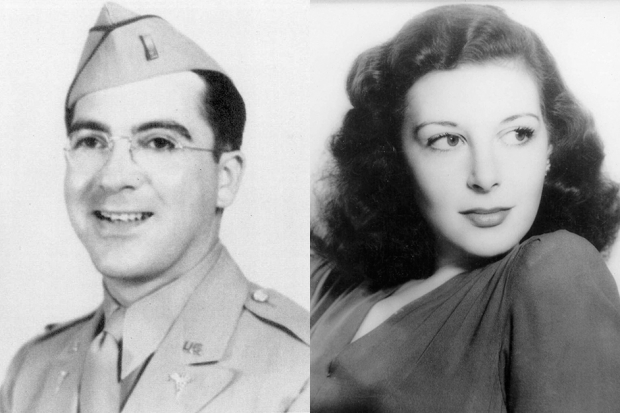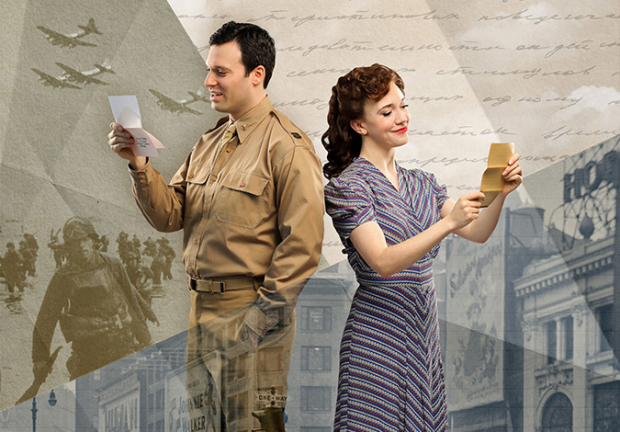First Person: A Family Legacy Captures a Moment in Time in Dear Jack, Dear Louise
Ken Ludwig mines his parents’ wartime correspondence for his latest play at Arena Stage.

(photo provided by Arena Stage)
Dear Jack, Dear Louise is the culmination of a lifelong journey, both as a playwright and as a son. I wrote it to celebrate my parents and their remarkable courtship during World War II. I also wrote it to help us remember the sacrifices, courage, and state of this country from 1941 to 1945, when our way of life was balanced on the edge of a knife.
My parents could not have been more different. Shy and self-effacing by nature, my father was born and raised in a steel town in central Pennsylvania, and he put himself through college and then medical school by dint of hard work and seriousness of purpose. Virtually the moment he graduated from medical school, he was drafted into the US Army and then stationed at a hospital in Medford, Oregon, where he ministered to the incoming wounded from the Pacific theater.
My mother, meanwhile, was growing up in Brooklyn, New York, and a more outgoing ball of fire never lived. Like many a Brooklyn girl, she aspired to a life in show business, and soon after high school, she was taking tap-dancing and singing lessons with the glint of Broadway in her eyes. Soon after that, she was living at a theatrical boarding house in midtown Manhattan with other Broadway hopefuls, rushing down the street, day after day, to the latest auditions.
There was never a more unlikely pair — and to add to the drama, they met not in person, but by letter. Their fathers introduced them by mail in 1942, and the poor kids, being 3,000 miles apart, had no choice but to write to each other if they ever hoped to become more than acquaintances. Thus it was that from 1942 to 1945, they wrote hundreds of letters to each other — and whether they ever met, I'll let the play tell the story. The answer may seem obvious, but plays have a way of surprising us, which is the source of much of their pleasure.

(photos provided by Arena Stage)
When I first thought about basing a play on my parents' lives during World War II, the form of the play — their letters, read aloud by two actors — felt self-evident. Normally my plays are more extravagant affairs, with a full complement of actors and scenery. But this time, in light of the intimacy of the world I was hoping to create, I thought that I could tell the story more clearly and profoundly using a smaller palette.
Letters are, innately, double-sided (no pun intended). On the one hand, they are the ultimate whispered exchange of private longings, intimate in the extreme. At the same time, there is a formality about letters which gives them a different kind of beauty — the kind that says, "I will express my intimate thoughts with carefully chosen language that reflects a sense of ceremony, a sense of expression that has been part of human culture for thousands of years."
As I wrote this play, I learned that letters have a third, rather metaphysical side to them. Despite their brevity, they have a way of letting us see the larger world around them in a manner that history books and even novels can't quite attain. Words are precious in letters. Space is at a premium. And often, such concision breeds depth.
In the case of Dear Jack, Dear Louise, my parents' letters are meant to speak at two levels. One projects a picture of my parents that I try to paint with the words I put into their mouths and pens. The other implicates the current state of our country. As in 1941, it feels that we're at a crossroads, both politically and morally, and whether we take the right direction will depend, as it did for my parents, on our courage and vision.
And I suppose this play raises an additional question: In the age of the internet, will we ever write letters again? If not, will emails, tweets, and Instagram posts ever tell stories in a way that can rank as literature? I have no certain answer. But I suspect that such new forms of storytelling , however wonderful, will never quite take the place of correspondence as a window into the soul of the age.

(© Tony Powell)







